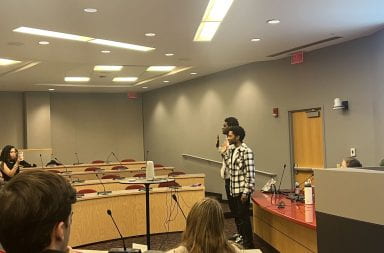By now most students, faculty and staff have abandoned their waistline resolutions for late night street meat and football munchies, so for those looking for a more realistic form of self-improvement, resolving to “go green” this year is an alternative several groups on campus recommend.
Ohio State is littered with opportunities to make environmentally-conscious choices like recycling and choosing alternative forms of transportation.
Corey Hawkey, sustainability coordinator at OSU’s Energy Services and Sustainability office, said OSU is now recognized as a bike-friendly campus, and has distributed more than 300 public recycling bins across campus and equips each individual dorm room with recycling infrastructure.
The difficult part is getting students to pay attention to what they’re doing. Students file in and out of buildings from the Ohio Union to the Thompson Library arbitrarily tossing scraps of garbage into clearly-marked bins.
“In the past we’ve found that if it wasn’t easy, people didn’t do it,” said Jessie Fears, President of Students for Recycling and fourth-year in environmental science. “It can be discouraging when people don’t care or don’t pay attention.”
Online resources outline exactly what can and cannot be recycled at OSU, but the big offense to the recycling bin is food and liquid waste, Hawkey said.
Most other materials, such as a wrong plastic, can be sorted out at some point throughout the process, but dumping the uneaten portion of food in a cardboard container is enough to contaminate a whole bag.
Taylor Cooper, a second-year in marketing, said the university has an effective marketing campaign for its recycling efforts.
Though some students might already be in tune to their environmental choices, Hawkey said the new year is a perfect opportunity for others to take advantage of the opportunities that OSU provides.
In February, OSU will be competing with other schools across the country in RecycleMania, which will focus primarily on residence halls, giving dorm-dwellers a chance to step up their game. Anyone organizing an event on campus can make it a zero-waste event by contacting the Energy Services and Sustainability offices.
The biggest impact students can make is to pay attention to what they’re doing on campus, and for those who already do, “be a watch dog,” Hawkey said.
“We need checks and balances, and we need to help each other to reach that common goal,” Hawkey said.


